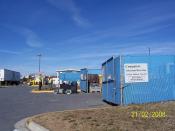Learning Outcome 3.
Q1 (a). The term 'traceability', refers to the completeness of the information about every step in a process chain. In the service industries it refers to the capability of tracing goods along the distribution chain. It is an important aspect, for example in the automotive industry, where it makes recalls possible, or in the food industry where food safety is of great importance. There are a number of factors that are recognised to contribute to the traceability of materials, parts, products etc. I will explain each of these in the following: -
- (i) Records - These are kept for the purpose of storing important information that has been collated during the process of any parts, goods, materials etc. They would be made up of any flow charts, files and archives of information keeping track of the process from start to finish. Usually they would include things such as test records, purchasing documents for the purpose of traceability certificates, routes followed by the workers, specific activities, materials and equipment used, which department did what, specifications/records for at least the product lifetime and each and every stage until distribution.
- (ii) Certificates - The purpose of certificates are to distinguish whether the goods, components etc have been approved and were of the required standard before they were moved to the next stage of the process.
- (iii) Authorised Signatures - The purpose of Authorised Signatures is to create accountability. Usually any materials/goods are put through inspection and if approved the inspector would sign documents verifying this.
- (iv) Test Records - There are a number of tests done on materials, components, goods etc in order to evaluate reliability, to show their life span, when they are likely to fail and so on. Therefore test records are kept in...


